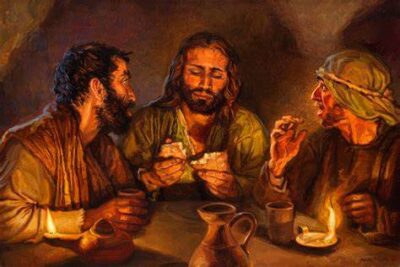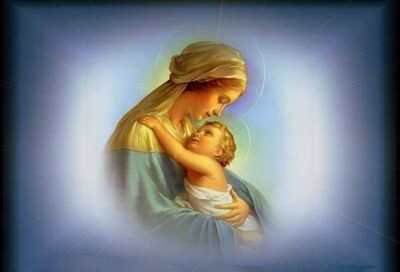February 12, 2023
|by N W
|
0 Comments
|
Baptism, Deacon Barry, Life, Light, Love, Mercy, Saints, Sin
Sixth Sunday in Ordinary Time
February 12, 2023 — Year A
Readings: Sir 15:15-20 / Ps 119 / 1 Cor 2:6-10 / Mt 5:17-37
by Rev. Mr. Barry Welch, Guest Homilist
I was at lunch several years ago with a very kind priest, and we got to talking about a young man we knew who started missing Mass and avoiding church and the sacraments and prayer life. In fact, he was openly disagreeing with many of the Church’s teachings. I said, “Father, even so, he’s a good guy; he’s nice and thoughtful, kind and generous,” and as I was saying that, the priest started getting visibly agitated. And pretty strongly he said, “Deacon, I’m tired of hearing ‘He’s a good guy, or a good boy, or a good girl.’ We’re not called to be good; we’re called to be holy.”
So, I had to kind of think and take it back a little bit; one, it was uncharacteristic of his demeanor, but two, it made me think quite a bit about it. And in a way, in today’s gospel, Jesus is saying something similar.
Does it work for me to say, “I’m ok, I’m a good guy, I haven’t killed anyone.” That’s our goal? That’s our standard? That’s the bar that we set for ourselves in our moral and spiritual lives? Just to simply avoid the major obvious sins, and I’m ok, I didn’t kill anyone, haven’t cheated on my wife, haven’t bad mouthed God. I haven’t lied, at least no big ones, just little white ones.
No, brothers and sisters, that’s not the goal. Jesus says today, “I have come.” That’s pretty important, the Son of God has said, “I have come.” What’s going to follow? I have come to fulfill the law and the prophets. I have come to fulfill, to extend, to complete, to make perfect. I have come. I have come. He’s come to call us to something higher, something better, something more noble, something heaven-like.
He shows us that worldly dominance passes the closer we get to God, and it’s replaced with humility, and love, and mercy. He sets the bar higher and calls us, not only to recognize that bar, especially the thou-shalt-not bars, but to look the other way for our goal: to look the other way from that bar, and to look inside for the ideals, inside of us where He planted His Holy Spirit at our baptism.
Do I look at that boundary, that thou-shalt-not-kill, that murder boundary, and just see how close I can get to it in my life without crossing over it into moral badness, if you will? I stay safe on this side: I really want to hurt the guy, but I’m not stepping over the line.
Or do I hold in my heart the love of my neighbor, the love of the other, and of their God-given true dignity? Do I work to remove my anger, or my resentment, or my jealousy, and replace it with love? Love, wishing the good of the other, wishing for that person to join me in the kingdom?
The ideal is a high bar and it’s not defined by a list of borders, a list of boundaries, a list of what’s morally good and what morally isn’t. It’s not contained in two lists: Here are the do’s and here are the don’ts. The bar is a change in our hearts; it’s a modification of the direction of our lives and our love.
What must I do to follow Jesus, to be a good Christian, to become holy? Every now and again in my spiritual life I ask myself that question, and I imagine some of you have asked it as well; what am I supposed to do to be a good Christian? And oftentimes when I’m talking with folks in RCIA who are considering coming into the Church, they have that same general question: What do I do to be a good Christian, and follower of Jesus?
And in moments of clarity, very rare moments of clarity, I can give them an answer: If you want to be a good Christian, doing what Jesus asks is a good start. Pope Francis had a similar answer, and he didn’t ask me for any help when he came up with it. He explains, “So if anyone asks what one must do to be a good Christian, the answer is clear: We have to do, each in our own way, what Jesus told us in the Sermon on the Mount.”
We’re in the third out of four weeks of going through the Sermon on the Mount during this ordinary time. Two weeks ago, we did the Beatitudes: “Blessed are they…” Last week we were salt and light. We’re still salt and light this week too. Next week we have another reading from the Sermon on the Mount.
So Pope Francis says, “Just do what Jesus told us in the Sermon on the Mount.” That’s pretty easy, isn’t it? Pretty simple? Well, it isn’t quite so easy when we probably have to hear the message over and over. Let’s read about it, let’s pray over it, let’s meditate over the gospel of Matthew, chapters five through seven. Wash, rinse, repeat. Read it again.
Let it sink into our hearts, so they’re pointing the opposite directions of those boundaries, those borders, the “I didn’t kill anybody.” Because the message is love centered on Christ, and it is directed toward others, wishing, praying for the good of the other. It’s our relationship in the world. It’s salt and light, and it’s mercy, forgiveness and mercy.
Now remember, mercy doesn’t mean leniency. It doesn’t mean morally compromising. It doesn’t mean lowering the bar. When Jesus is giving His teaching today, you don’t see Him lowering the bar, He’s extending the bar into the heart. He’s not appeasing the social norms or the civil norms or the governmental norms of his day, He’s not doing it then, He’s not doing it today, because the ideal is high and we as Christians are bound to Him and our goal is heaven, our goal is to be a saint. That’s my goal, I pray that it’s your goal as well. It’s a very high ideal.
Mercy is there, mercy is available, sure, when we fall short of the ideal, when we miss the mark, which is another way to say when we sin. But Jesus and His Church don’t lower the bar, because it’s that important. Instead, we are called to extend His love, and extend His mercy, to live a moral life. We can’t do that alone; we cannot do it by ourselves; we need help.
And we get help, praise God we get help, because we’re washed of our sin and filled with light at our baptism, the light of Christ at our baptism. So that Jesus accompanies us and assists us because he becomes our moral compass and He is our only goal, He is our moral bar, and our earthly wish is to carry Him always in our hearts, because we don’t want to just be a good guy or a good girl or a good woman or a good boy. We don’t want to be just a good guy, but we want to be saints.
At the beginning of every mass, we have this opening prayer, when Father says “let us pray” after the Gloria. It’s called the “Collect.” That’s when we’re all collecting together and beginning the Mass, and that prayer is a summary of the purpose of today’s Mass. I want to repeat it because I think it’s beautiful: “O God who teach us that You abide in hearts that are just and true, grant that we may be so fashioned by Your grace as to become a dwelling pleasing to You.” Isn’t that beautiful? Praise God and amen.
KEEP READING
 540-586-8988
540-586-8988 










